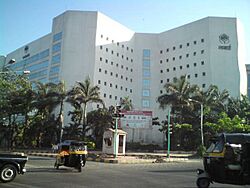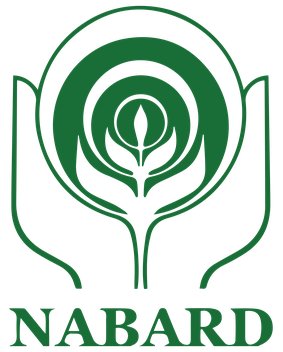National Bank for Agriculture and Rural Development facts for kids

NABARD Head-office, Mumbai
|
|

NABARD's Logo
|
|
| Predecessor | Agricultural Refinance and Development Corporation |
|---|---|
| Formation | 12 July 1982 |
| Type | All India Development Financial Institution / Regulatory Body |
| Purpose |
|
| Headquarters | Mumbai, India |
| Owner | Ministry of Finance, Government of India |
|
Chairman
|
Shaji K V |
|
Development Finance Institution of
|
|
| Subsidiaries | NABkisan, NABsamruddhi, NABfins, NABsanrakshan, NABfoundation, NABcons, NABventure |
| NABARD Act 1981 [1] | |
The National Bank for Agriculture and Rural Development, better known as NABARD, is a special bank in India. It is the most important financial group for farming and life in the countryside. NABARD's main job is to support and watch over other banks that give loans to farmers and people in rural areas.
NABARD was created by the Indian Parliament through the NABARD Act of 1981. It is completely owned by the Government of India and works with the Ministry of Finance. Think of it as the government's main tool for helping India's villages and farms grow and succeed.
Contents
The History of NABARD
Even in its early days, the Government of India knew that providing loans was key to improving life in rural areas. The Reserve Bank of India (RBI), India's central bank, was asked to look into this. On March 30, 1979, a special committee was formed to study how to best provide money for agriculture and rural development.
The committee suggested creating a new, special bank. This bank would focus completely on the needs of rural India. Following this idea, the Indian Parliament passed a law, and NABARD was officially born on July 12, 1982.
NABARD took over the farming-related jobs from the RBI. It started with an initial fund of 100 crore rupees. Today, it is fully owned by the Government of India and plays a huge role in supporting the country's rural economy.
What Does NABARD Do?
NABARD has three main jobs that help improve life for people in villages and on farms. It acts as a "bank for banks," a supervisor, and a development partner.
A Bank for Other Banks
NABARD is a top-level agency that provides money to other banks and financial institutions. These local banks then give loans to farmers and rural businesses. This is called refinancing, which is like giving a loan to a bank so it can give out more loans.
It works with many types of banks, including regional rural banks and cooperative banks. The money helps people buy equipment, improve their farms, and start small businesses in villages.
Supervising Rural Banks
NABARD is also a supervisor. It checks on State Cooperative Banks, District Cooperative Central Banks, and Regional Rural Banks to make sure they are working properly. It helps these banks become stronger and more efficient.
This includes training their staff and helping them manage their money better. By doing this, NABARD ensures that the banking system in rural areas is healthy and can support the local people.
Helping Communities Grow
NABARD is famous for its 'SHG Bank Linkage Programme'. This program helps banks give loans to Self-Help Groups (SHGs). SHGs are small groups of people, usually women, who save money together and support each other.
This program has helped millions of women get access to loans, which they use to start small businesses and improve their families' lives. NABARD also runs programs to manage natural resources, like improving soil and water, helping tribal communities, and promoting new farming methods.
Working with Global Partners
NABARD works with international organizations to bring new ideas and money to rural India. These partnerships help improve farming and create better lives for people in villages.
- World Bank: The World Bank and its related groups give advice and financial help to NABARD. This helps support projects for rural development.
- UNDP: NABARD and the UNDP work together on using data to create new ideas in farming. This helps smallholder farmers by sharing technology and information.
- KfW: This German development bank works with NABARD on several projects. These include programs for tribal development and managing natural resources like water and soil.
- Women World Banking: This organization partners with NABARD to help more people, especially women, use banking services. They work together on a program called Jan Dhan Plus to make sure women with bank accounts can use them effectively.
NABARD's Offices and Teams
NABARD's main office is in Mumbai. It has 31 regional offices in different states and 336 district offices across the country. It also runs six training centers.
Each regional office is led by a Chief General Manager. In the districts, District Development Managers work to carry out NABARD's projects at the local level.
NABARD's Family of Companies
NABARD has seven smaller companies, called subsidiaries. Each one has a special job to help different parts of the rural economy.
- NABKISAN: Provides loans to businesses in farming and other rural activities.
- NABSAMRUDDHI: Gives loans for non-farm activities like small businesses, housing, and education in rural areas.
- NABFINS: Offers small loans (microfinance) to low-income families, mostly to women in Self-Help Groups.
- NABFOUNDATION: A non-profit company that works on special projects to help rural communities, often with partners.
- NABCONS: This is the consulting company of NABARD. It gives expert advice on farming and rural development.
- NABVENTURES: This company invests in new startup companies that are working on new ideas in agriculture and technology for rural areas.
- NABSanrakshan: Provides guarantees for loans to make sure that farming and rural development projects can get the money they need.
See also
- Grade-A NABARD Examination
- Rural development
- Cooperative banking
- Ministry of Finance (India)
- Ministry of Co-operation
- Ministry of Agriculture and Farmers' Welfare
- List of national development banks
Images for kids
 | Laphonza Butler |
 | Daisy Bates |
 | Elizabeth Piper Ensley |


